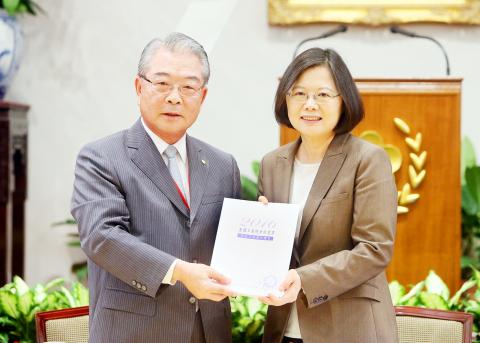President Tsai Ing-wen (蔡英文) yesterday said that the government would work to strike a balance between the interests of workers and industry, and find a win-win solution for both sides.
At a meeting with business leaders, Tsai said that while the administration would not leave enterprises to face the pressures of transformation alone, it would be certain to ensure workers’ rights.
She made the comment in response to the ongoing dispute concerning workers’ hours while meeting 55 of the Chinese National Federation of Industries board directors and supervisors, including chairman Hsu Sheng-hsiung (許勝雄) and vice chairman Leslie Koo (辜成允).

Photo: CNA
Tsai said that when she met representatives of small and medium-sized enterprises several weeks ago, she told them that industries in Taiwan have to speed up their transformation so that their profits can increase, more jobs can be created and salaries can be raised.
Tsai said that she understands that enterprises have to race against time to complete orders, while workers care more about salary levels and rest breaks.
“As the head of state, my job is not to curry favor with anybody. My responsibility is to decide on a direction of development for the nation and to ensure that everyone is on the development train,” Tsai said, adding that workers and businesses should move toward the goal together.
The nation’s most important goal is modification of the economic structure, she said, adding that the government would improve the investment environment and take measures to help companies, particularly small and medium-sized enterprises — which account for 98 percent of Taiwan’s total businesses — to transform themselves, while ensuring workers’ rights.
“The government has the responsibility to pull workers back from the brink of low pay and overwork,” she said, adding that the government would ensure all workers’ rights to receive paid holidays and overtime pay, and impose restrictions on work hours through robust enforcement of labor laws.
Tsai also said businesses should think about how to generate benefits and improve employees’ working conditions.
She also mentioned the dispute over a draft amendment to the Labor Standards Act (勞動基準法), saying that the proposal is aimed at ensuring workers’ right to a maximum of two paid days off per week, but has sparked heated debate among employees and employers.
The Executive Yuan and the Legislative Yuan should do their utmost to explain the issue to those concerned and allow them to express their views in order to reach a consensus on the matter, she said.
The government would also tackle a dispute regarding whether to cut the number of officially designated holidays per year from 19 to 12, as part of its plans to implement a two days off, 40-hour work week system, Tsai said.

US President Donald Trump yesterday announced sweeping "reciprocal tariffs" on US trading partners, including a 32 percent tax on goods from Taiwan that is set to take effect on Wednesday. At a Rose Garden event, Trump declared a 10 percent baseline tax on imports from all countries, with the White House saying it would take effect on Saturday. Countries with larger trade surpluses with the US would face higher duties beginning on Wednesday, including Taiwan (32 percent), China (34 percent), Japan (24 percent), South Korea (25 percent), Vietnam (46 percent) and Thailand (36 percent). Canada and Mexico, the two largest US trading

AIR SUPPORT: The Ministry of National Defense thanked the US for the delivery, adding that it was an indicator of the White House’s commitment to the Taiwan Relations Act Deputy Minister of National Defense Po Horng-huei (柏鴻輝) and Representative to the US Alexander Yui on Friday attended a delivery ceremony for the first of Taiwan’s long-awaited 66 F-16C/D Block 70 jets at a Lockheed Martin Corp factory in Greenville, South Carolina. “We are so proud to be the global home of the F-16 and to support Taiwan’s air defense capabilities,” US Representative William Timmons wrote on X, alongside a photograph of Taiwanese and US officials at the event. The F-16C/D Block 70 jets Taiwan ordered have the same capabilities as aircraft that had been upgraded to F-16Vs. The batch of Lockheed Martin

China's military today said it began joint army, navy and rocket force exercises around Taiwan to "serve as a stern warning and powerful deterrent against Taiwanese independence," calling President William Lai (賴清德) a "parasite." The exercises come after Lai called Beijing a "foreign hostile force" last month. More than 10 Chinese military ships approached close to Taiwan's 24 nautical mile (44.4km) contiguous zone this morning and Taiwan sent its own warships to respond, two senior Taiwanese officials said. Taiwan has not yet detected any live fire by the Chinese military so far, one of the officials said. The drills took place after US Secretary

THUGGISH BEHAVIOR: Encouraging people to report independence supporters is another intimidation tactic that threatens cross-strait peace, the state department said China setting up an online system for reporting “Taiwanese independence” advocates is an “irresponsible and reprehensible” act, a US government spokesperson said on Friday. “China’s call for private individuals to report on alleged ‘persecution or suppression’ by supposed ‘Taiwan independence henchmen and accomplices’ is irresponsible and reprehensible,” an unnamed US Department of State spokesperson told the Central News Agency in an e-mail. The move is part of Beijing’s “intimidation campaign” against Taiwan and its supporters, and is “threatening free speech around the world, destabilizing the Indo-Pacific region, and deliberately eroding the cross-strait status quo,” the spokesperson said. The Chinese Communist Party’s “threats